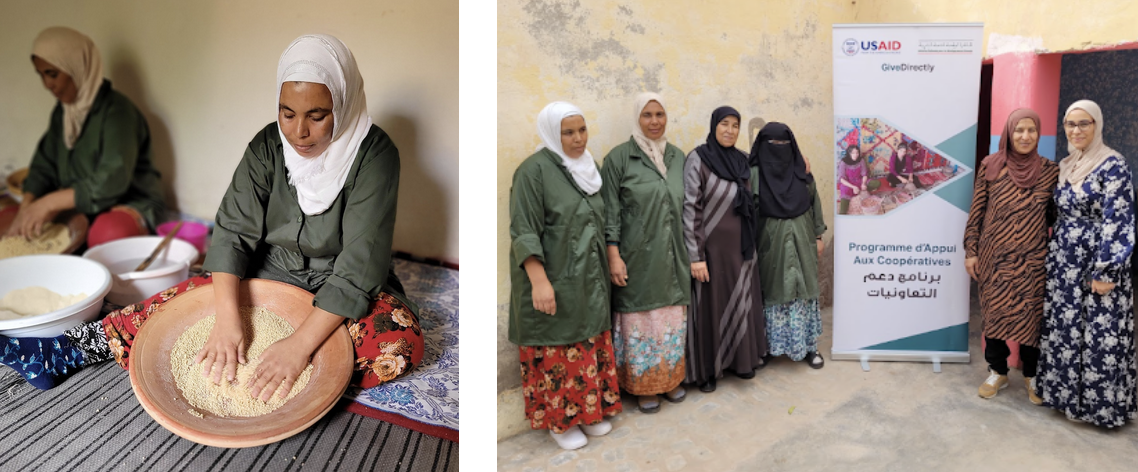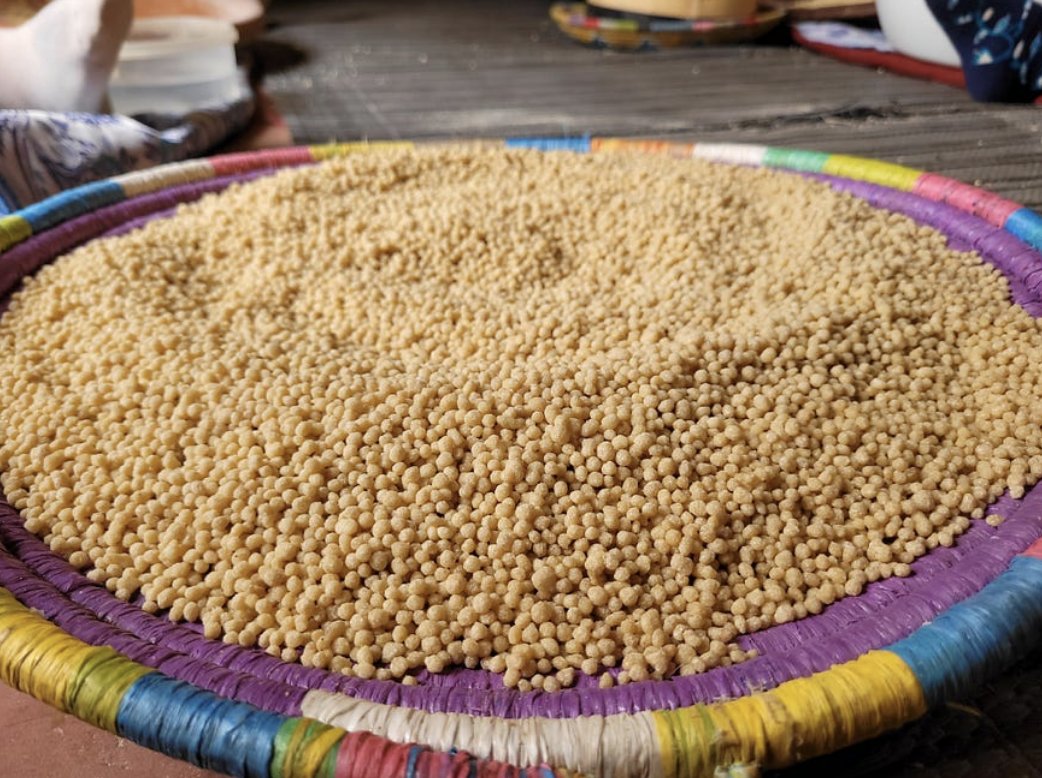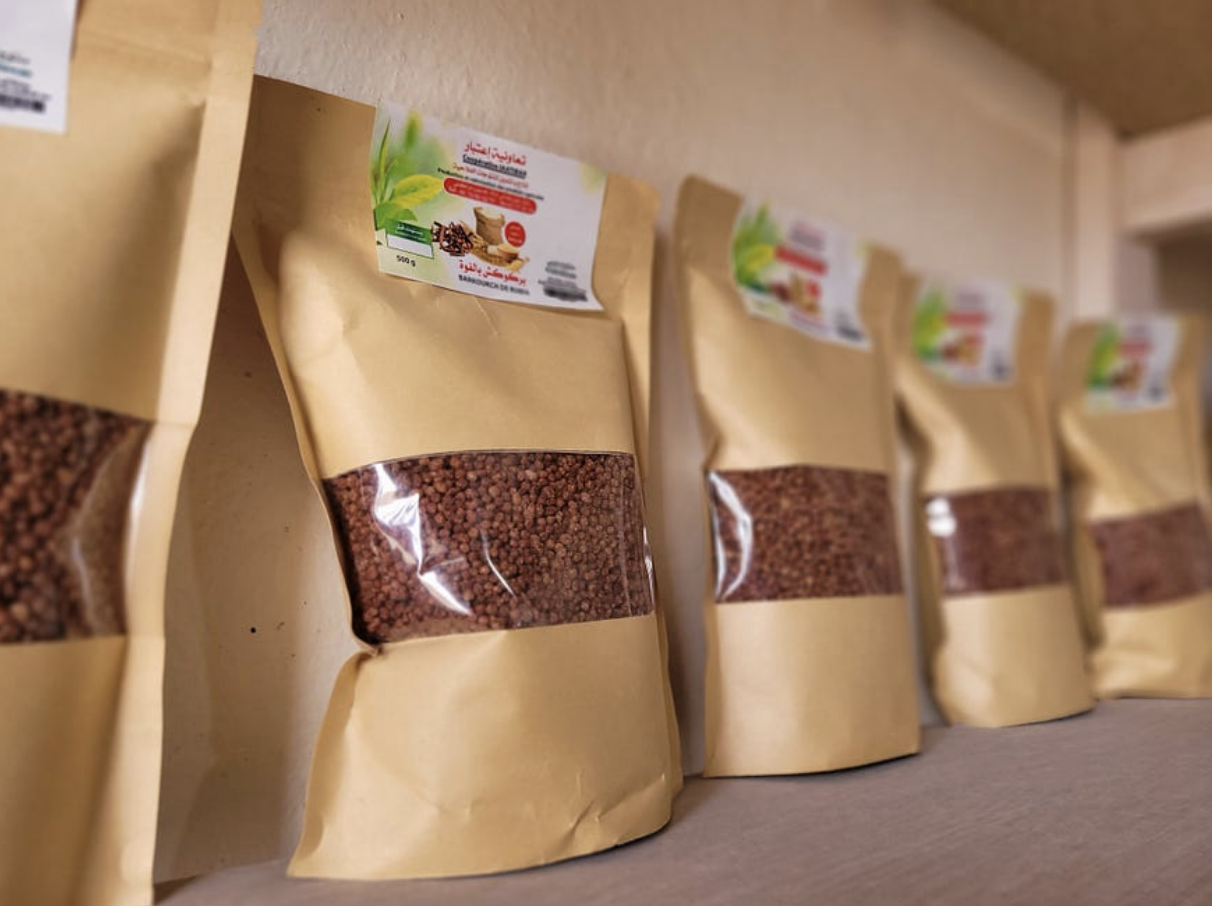Women-Led Cooperatives Drive Resilience in Morocco

Like thousands of small businesses in the United States, cooperatives in Morocco have been negatively impacted by the COVID-19 pandemic, in addition to shocks like drought and food insecurity. And like the support provided across the United States to help boost and revitalize families and businesses, USAID’s Mission in Morocco has been providing support to help revitalize vulnerable Moroccan cooperatives.
In 2021, USAID and GiveDirectly, a global nongovernmental organization that specializes in cash transfers, launched the Cooperative Financing Program (CFP) to fund and help jumpstart cooperatives in Morocco, especially women-led rural groups working across a variety of economic sectors, including agriculture, handicrafts, and tourism.
Cooperatives in Morocco play a vital role in the country’s economic and social development—there are 47,000 across the country that benefit local businesses and communities. Cooperatives are critical components of the agriculture, artisan, and tourism sectors, among many others.
In recent years, women-led cooperatives in particular have thrived, building a reputation for providing good-quality services at affordable prices and reaching a wide range of consumers.
Prior to the COVID-19 pandemic, Touria Abounaoufil’s Women Cooperative IATIBAR (WCI), a producer of couscous and olive oil in the rural areas of the Marrakech Safi region of Morocco, was experiencing an increase in demand from consumers, and its employees were earning enough money to meet the needs of their families.
However, the economic progress of WCI and cooperatives nationwide have been affected by three ongoing crises: the pandemic; the ongoing drought, the country’s worst in four decades; and more recently, inflation stemming from the Russian invasion of Ukraine.
GiveDirectly made cash payments to 607 cooperatives in Morocco, assisting approximately 3,921 people. Each cooperative—with business plans in hand—received approximately $9,000 to foster their operations, reduce the negative impact of economic shocks, and build a more resilient future for their members and families.
And in late September, CFP received an additional $2 million from USAID, new funding that comes in response to the strain Russia’s invasion of Ukraine has put on markets worldwide. That funding plus an equal match from GiveDirectly means an additional $4 million to assist Moroccan agricultural cooperatives in increasing production and countering recent economic shocks. With this additional funding, approximately 330 cooperatives will receive a $9,000 capital injection to help them rebuild their agriculture-based businesses and ensure food security amid the ongoing crises.
Receiving the CFP capital infusion was a major event in Touria’s village, as the WCI women were previously barely getting by. “Even now, it all seems so unbelievable,” Touria said, holding back tears.
A lockdown instituted at the beginning of the pandemic meant that the women could not sell their olive oil, so their savings dried up. The country’s worst drought since the 1980s also caused losses and damages to livelihoods across agriculture and water sectors, including to olive trees. In turn, the heat led to excessive fruit loss and olive prices soared as a result. Touria could no longer afford olives, the input for her entire business.
“We plunged overnight into poverty, hunger, despair, and uncertainty,” said Nezha, another WCI member, mother to five children, and wife of a mentally ill husband. “We were struggling to feed our children.”

Left: Members of the Women’s Cooperative IATIBAR make couscous by hand from village whole wheat flour. Right: Touria Abounaouafil, president of the Women’s Cooperative IATIBAR (WCI), second from the right, poses with other WCI members outside of the cooperative in Ain Nafad, in the Marrakech region of Morocco. / Andrew Manohan, USAID
The funding has enabled WCI to bounce back from the economic consequences of the pandemic and the drought, and Touria wasted no time in resuming her olive oil production activities, as the money her cooperative received provided her the opportunity to once again afford the price of olives.

Couscous in the process of being hand-made by the cooperative from village whole wheat flour. Andrew Monahan, USAID
With her business back up and running, she made the smart decision to diversify her business, and decided to start producing and selling homemade couscous. With the project funding, Touria procured wheat grains from local farmers, which WCI transformed into couscous. She also bought packaging for the couscous and a ticket printing machine to label both the couscous packages and bottled olive oil.

Sales of Madar Rubin herb couscous have soared, especially among women during pregnancy and childbirth. / Andrew Monahan, USAID
Next, she purchased a computer, determined to take her business digital and increase her customer base. As her dreams got bigger, the physical space of her cooperative was still limited. Touria announced plans to expand her business by opening up another location in her village, where she will continue to operate and grow her cooperative. She says she’ll continue selling her products to clients, including a nearby hotel, her fellow Moroccans, and tourists passing through the region.
After everything that has happened, Touria stood in her newly equipped store gazing at the shelves as if in a dream. She took a bottle of olive oil in one hand and a couscous package in the other:
“These are part of our cultural identity. And, no matter what their budget is, Moroccans will always invest in olive oil. Such blessed oil from such a blessed tree! The USAID grant helped the cooperative keep this heritage alive,” she said.
About The Author(s)
Zohra Zeroual
Administrative Assistant in the General Development Office
USAID’s Mission in Morocco
Drew Sullivan
Public Affairs Specialist
USAID’s Bureau for the Middle East